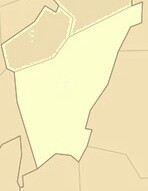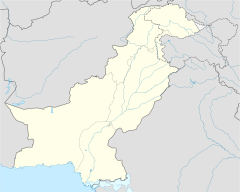
Dera Ismail Khan, abbreviated as D.I. Khan, is a city and capital of Dera Ismail Khan District, located in Khyber Pakhtunkhwa, Pakistan. It is the 37th largest city of Pakistan and fifth largest in the province of Khyber Pakhtunkhwa by population. Dera Ismail Khan is situated on the west bank of the Indus River, at its junction with the Gomal River.
Events from the year 2009 in Pakistan.

The 2009 Karachi bombing or Ashura attack took place on 28 December 2009 inside a Shia procession commemorating the day of Ashura, at Muhammad Ali Jinnah Road, Karachi, Pakistan. Ashura is the holiest of days for followers of Shia Islam and marks the anniversary of the death of Hussain, grandson of the Islamic prophet Muhammad, who was killed at the battle of Karbala in 680. At least 30 people were initially reported to have been killed, later figures revealed even more deaths while dozens were left injured in the wake of the attack. The attacker marched amongst the procession with tens of thousands of people attending the march. There is some speculation amongst officials as to whether the nature of the blast was that of a suicide attack or a remotely detonated or planted bomb.
Jamaat Ahle Sunnat is a Muslim religious organization in Pakistan that represents the Barelvi movement. It is supported by Mashaikh including all spiritual centers. As a Sunni organisation it has adopted many Sufi customs and traditions. Jamaat e Ahle Sunnat is a representative of sunni(sufi) nation of Pakistan. It works under the superivision of spiritual centers including Golra Sharif, Sial Sharif, Pakpattan Sharif, AliPur Syedan Sharif and others. Pir of Golra Sharif is the current pattern in chief of the organization.
The August 2011 Khyber Agency bombing occurred on 19 August 2011 in Jamrud, Ghundai within the Khyber Agency of FATA, Pakistan. At least 48 people were reported to have died after a suicide bomber exploded his vest at a mosque during Friday prayers in the month of Ramadan when about 300-500 people were praying; at least 40 others were also wounded.
This is a list of terrorist attacks in Pakistan in the calendar year 2011.
These are the list of Terrorist attacks in Pakistan in 2010.
In 2008, Pakistan saw 40 terrorist attacks, which caused 154 fatalities and 256 injuries.
In 2009, Pakistan suffered 50 terrorist, insurgent and sectarian-related incidents that killed 180 people and injured 300.
This is a list of terrorist incidents in Pakistan in 2004.
This is a list of terrorist incidents in Pakistan in 2012. Pakistan has faced numerous attacks by insurgents as a result of the ongoing War in North-West Pakistan by the Pakistani military against militant groups, part of the War on Terror. At the same time, there have also been numerous drone attacks in Pakistan carried out by the United States which exclusively target members of militant groups along the Afghan border regions.
This is a list of terrorist incidents in Pakistan in 2013. Some of the incidents are sectarian in nature and the TTP is responsible for a majority of them.
Terrorist incidents in Pakistan in 2017 include, in chronological order:
Operation Radd-ul-Fasaad is a codename of a combined military operation by the Pakistani military in support of local law enforcement agencies to disarm and eliminate the terrorist sleeper cells across all states of Pakistan, started on 22 February 2017. The operation is aimed to eliminate the threat of terrorism, and consolidating the gains of Operation Zarb-e-Azb which was launched in 2014 as a joint military offensive. It is further aimed at ensuring the security of Pakistan's borders. The operation is ongoing active participation from Pakistan Army, Pakistan Air Force, Pakistan Navy, Pakistan Police and other Warfare and Civil Armed Forces managed under the Government of Pakistan. More than 375,000 operations have been carried out against terrorists so far. This operation has been mostly acknowledged after Operation Zarb e Azb.
The August 2008 Dera Ismail Khan suicide bombing took place on 19 August 2008, near the Emergency Ward of District Headquarter Hospital in Dera Ismail Khan, killing 32, including 7 policemen. Tehreek-i-Taliban Pakistan claimed responsibility for the attack.
The 2009 Dera Ismail Khan suicide bombing was a suicide bombing of a funeral procession in Bargah Kotli Imam, Dera Ismail Khan, on February 20, 2009. The attack killed 32 and injured 65 people.
On 29 January 2007, a suicide bomber blew himself up killing a policeman and a civilian and wounding 7 others in Dera Ismail Khan, Khyber Pakhtunkhwa, Pakistan. The incident happened during month of Muharram on the day of Ashura, the holiest day of the year for Shi'ites.
On 23 June 2017, a series of terrorist attacks took place in Pakistan resulting in 96 dead and over 200 wounded. They included a suicide bombing in Quetta targeting policemen, followed by a double bombing at a market in Parachinar, and the targeted killing of four policemen in Karachi.
Terrorist incidents in Pakistan in 2018 include:
On 22 July 2018, 3 days before general elections, a suicide bomber blew himself near the vehicle of former KPK provincial minister of Agriculture Ikramullah Khan Gandapur in Kulachi, Dera Ismail Khan District, Pakistan. The prime target of attack, Gandapur was brought to Dera Ismail Khan in critical condition where he succumbed to his wounds. Apart from Gandapur, his driver and one of his guards was also killed and three more people were injured. Tehrik-i-Taliban Pakistan (TTP) claimed responsibility for the assault describing Gandapur's killing of their colleague militants as the motive. The attack was widely condemned across Pakistan.



